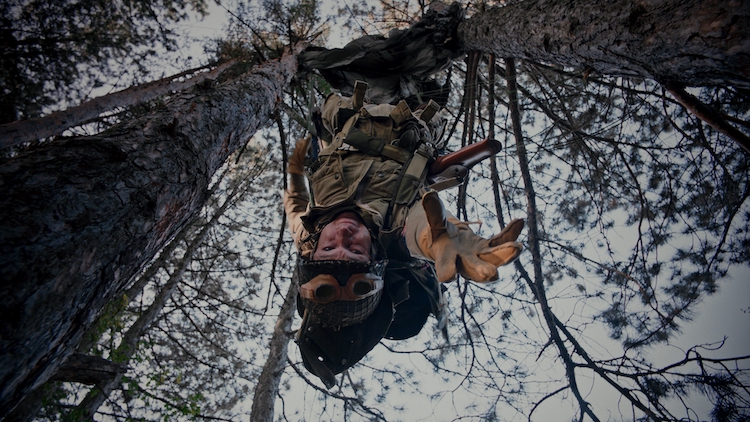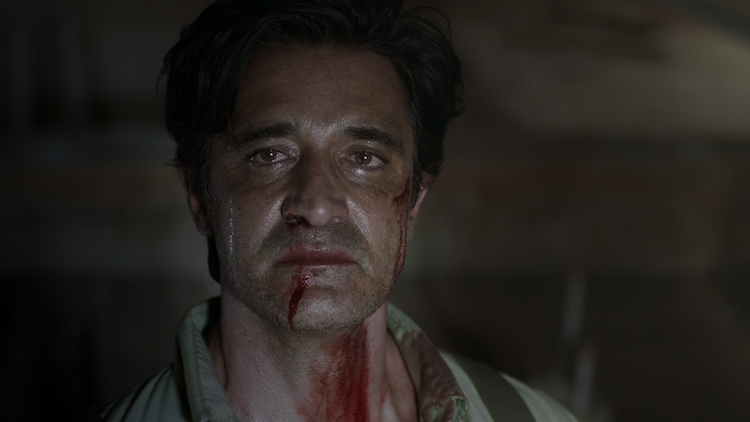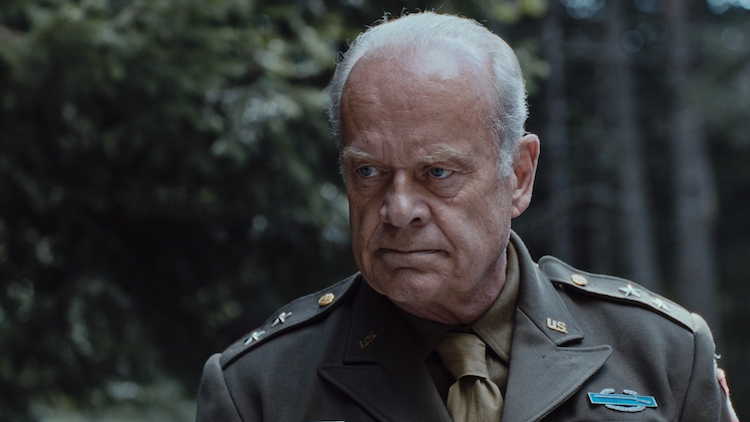Hey friends, Barbarella here. I’ve had quite a couple months, and I wish I could say that I was gallivanting around the globe, but not this time. I’ve been sick a good chunk of it. In fact, I had quite a fever when I screened Murder Company, written by Jesse Mittelstadt and directed by Shane Dax Taylor. I don’t know that it would be fair to the filmmakers to review the film, given that I was feeling so awful while watching it that I don’t think my thoughts would necessarily be a true reflection of how the movie was. I will make a few observations, though.
![[L-R] James Wiles as “Verrill” and Kelsey Grammer as “Haskel” in the war/action film, MURDER COMPANY, a Maverick Film & Complex Corp release. Photo courtesy of Maverick Film & Complex Corp. [L-R] James Wiles as “Verrill” and Kelsey Grammer as “Haskel” in the war/action film, MURDER COMPANY, a Maverick Film & Complex Corp release. Photo courtesy of Maverick Film & Complex Corp.](https://media.aintitcool.com/media/uploads/article_images_2022/barbarella/murdercompany_still_5.jpg)
First of all, Kelsey Grammer was my favorite thing about Murder Company, which is currently On Digital and On Demand, and I wanted him to have far more screen time. I love a serious Kelsey Grammer, and he's incredibly serious in this. Second, while there was far less graphic violence and gore than I would have expected from a war movie made in this day and age, the filmmakers seemed to compensate for that with the amount of people flying around, proving yet again that stunt men are insane. “Yeah, you can hurl me into that tree. Sure.” Finally, could we please stop having people engage in casual conversations while walking through enemy-occupied territories? I understand that it seems a good way to develop characters, but it drives me crazy every time anyone has a conversation at a normal volume as if they’re just strolling through the park instead of walking in a place where people who want to kill them could be lurking at any point. This applies to everyone who makes war movies - seriously, stop; please find another way to convey that information.
The story follows a group of soldiers tasked with locating a member of the French Resistance and taking him behind enemy lines to take out a Nazi target during the D-Day Invasion.
All right, moving on to the real point of this post, and that’s to share my interview with director Shane Dax Taylor. I had the opportunity to chat with him via Zoom while I was still feverish and feeling poorly. He was incredibly gracious and understanding when I asked to keep my camera off. Check out what he had to say!
“I want to thank you because Ain't It Cool News was one of the first sites that ever put me on the board. I had done the Santa Barbara Film Festival and won that, and then they interviewed me way back in the day – twenty-something years ago – and had great things to say. That really snowballed from there to help me get other films. I owe a lot to Ain't It Cool News. I will say that for sure.”
![[L-R] Pooch Hall as “Coolidge” and William Moseley as “Southern” in the war/action film, MURDER COMPANY, a Maverick Film & Complex Corp release. Photo courtesy of Maverick Film & Complex Corp. [L-R] Pooch Hall as “Coolidge” and William Moseley as “Southern” in the war/action film, MURDER COMPANY, a Maverick Film & Complex Corp release. Photo courtesy of Maverick Film & Complex Corp.](https://media.aintitcool.com/media/uploads/article_images_2022/barbarella/murdercompany_still_8.jpg) Well, thank you. We appreciate that. How'd you get involved in this project?
Well, thank you. We appreciate that. How'd you get involved in this project?
“I've done a lot of action films, and then I've worked with producer Richard Switzer before, and then I let it be known that I would love to do a war film; I've always just been a fan of them. I come from a military family. I've been offered a few of these, and then this is one I need to make. It really hit home. I'm just very happy that I dove in head first and got to make this film."
Cool. It seems like there's been a resurgence of World War II movies lately. Why tell this story now?
“For me, I've always loved war films, like I said, and my grandfather, I've shown this, but this was Normandy. (Shows an old WWII photo of soldiers in uniform and points to one). This is my grandfather.”
Oh, wow.
“This picture's been around. It's been in a lot of magazines and whatnot. I grew up with that, and I always just wanted to make my family proud. My grandfather's no longer with us, but he fought for this country. I knew I would eventually head in that direction, but it took this film and this particular story to really hit home. This is the first one I want to make. And hopefully I will continue to make more films.”
 Very cool. Have you been watching those colorized docu-series of all the World War II stuff?
Very cool. Have you been watching those colorized docu-series of all the World War II stuff?
“Oh, absolutely. Yeah. I've always been a fan of those. I'll have them on in the background. I've got three daughters, so they don't understand the whole mentality of war films, but I grew up with them because my dad was into them. To see these now, Saving Private Ryan, Fury, Thin Red Line, Sisu that came out last year – there are just so many films the cast and I were just passing around like, “Hey, check this out,” or “Check out this documentary. Go to this Netflix one,” or whatever it may be. It’s quite fascinating. There are so many stories to tell.”
Yeah. What prep work did you give the actors for their roles?
“We talked about what films, of course, not just the Saving Private Ryan films, but even some old westerns about men on a mission type of films, then I would sit down a couple of these guys who I’ve known twenty-five years or so. It was easy for me to talk to them, but each of these characters I went through, no matter if you're a US soldier or you're playing a German, tell me your backstory. And then I incorporated that within the film. Some of these stories that when these guys are around the campfire, so to speak, they're talking about they're going to go home and meet their kid for the first time. Those were stories that their grandparents or parents dealt with. Even though it might not be true for their actual characters, it was true to Jilon [VanOver] and his experiences. These guys would bring their own patches that we would sew on because that was their grandfather's patch. One had boots that their grandfather wore, the same boots, which were not comfortable, but they sucked it up. It was just make it as personal as possible.”
What was the experience like filming on location in Bulgaria ?
"It had pluses and minuses. In Sofia, I'd never shot there, neither did any of the cast. When we showed up, the crew was phenomenal. I mean, they do all the Millennium films, they do The Expendables and Olympus has Fallen, and all those films over there. They'd worked together many, many times, which made it very easy. But for us, I showed up without my wife and kids and so did the other actors. At the end of each day, we would go have dinner together, or go have drinks, or on weekends, we'd go tour the city or go hiking or whatever we would do. It brought us closer together. If we'd each had our wives or significant others, we might be touring and doing that with them, where this was like, “Let's go to a movie,” and we would all go together. We had additional days in the front end, too, to get together and go through. I was able to bring all these actors to these sets before and say, “Okay, this is where this happens or this happens,” and we can walk through it together, as opposed to just showing up on the day and going, “Okay, stand there, and this is where you're coming from. This is where you're going.”

Right. What scene required the most prep work, and what kind of prep work was involved in it?
“Great question. I've done a lot of action films, so I'm used to one versus one or two guys fighting or whatever, shooting or whatever it may be, but there was one particularly long scene that takes place when we had 150 extras and stuntmen on set. We had 100 crew, so we had 300 people on set. We had two and a half days to shoot one sequence that should have been two weeks by itself. Yeah. Just fortunately we had a month or so of prep so I could go there in advance and just shot list or pre-vis every location and every scene. But yeah, that was definitely the most difficult, trying to figure out 150 villains descending on our crew.”
It seems like a lot of people were being flung around. Did anyone get hurt?
“There was a lot of people. Fortunately, there was not a single injury on set. There was some bruises and little things, but fortunately nothing serious. We were catching people on fire; we're slinging them into trees. We were doing a lot. It was a huge scope on such a tight shoot. And normally when you have such a tight shoot, corners are cut, but we made sure that everybody was okay and having 150 extras, 50 of them are stunt guys. They could focus on their one thing. It's like you have one focus, and you're in the background, or you're falling down, or you're on fire. It was just one particular stunt that they were doing.”
Behind the scenes, is Kelsey Grammer more comedic or more serious, and do you have a story to illustrate your viewpoint?
 “Kelsey is amazing. He was on board before I came on and just to hear his stories, he would talk to everybody, like, “Barbara, so tell me about yourself. Where are you from? Where's your family?” He would want to know personal stories because he's just that guy, and he was genuine, and that's what shocked me. I've been on sets with huge actors like him, and they just want to just show up, say their lines and leave. He was invested, and he came with personal stories. He has his own alcohol company. My family owns a bourbon distillery. We talked about other things outside of that, and he's just a phenomenal guy. Hopefully, that's the first of many films I get the opportunity to work with him on because he just lifts everybody up, whether you're acting opposite him in the scene, or you're a director like myself. I mean, he really brings it, and I'm honored to say that I've worked with him.”
“Kelsey is amazing. He was on board before I came on and just to hear his stories, he would talk to everybody, like, “Barbara, so tell me about yourself. Where are you from? Where's your family?” He would want to know personal stories because he's just that guy, and he was genuine, and that's what shocked me. I've been on sets with huge actors like him, and they just want to just show up, say their lines and leave. He was invested, and he came with personal stories. He has his own alcohol company. My family owns a bourbon distillery. We talked about other things outside of that, and he's just a phenomenal guy. Hopefully, that's the first of many films I get the opportunity to work with him on because he just lifts everybody up, whether you're acting opposite him in the scene, or you're a director like myself. I mean, he really brings it, and I'm honored to say that I've worked with him.”
Well, that's good to hear. I can't believe you shot this in twelve days. How stressful was that for you?
“It was very stressful. I mean, I've been doing this for twenty-something years. When I started, you had twenty-five or thirty days, and it just seems like the more we go along, it’s just they want the same amount of action. They want the same set pieces, but these financiers, they just want it to be done in less and less time 'cause every day costs $30,000, $50,000, whatever that number is, $100,000. Let's try to do it in as little time as possible. And it's a shame because the scene with the 150, we shot that two and a half days, and that should have been two weeks. Unfortunately, that's just not the time that we're living in. That's just how it is”
Well, Shane, thank you very much for talking with me. It's been nice to meet you.
“Thank you, Barbara. I hope you feel better soon.”
Murder Company, starring Kelsey Grammer, William Moseley, and Joe Anderson, is currently On Digital and On Demand. Check out the trailer!
